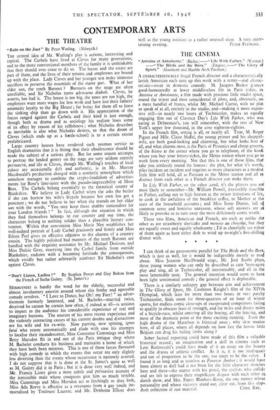THE CINEMA
"Antoine et Antoinette." (Railto.)—" Life With Father." (Warner.) —" The Birds and the Bees." (Empire.)—" The Glory of Sport." (Gaumont and Marble Arch Pavilion.)
A CHARACTERISTICALLY frugal French director and a characteristically lavish American each turn up this week with a sunny—and charac- ter;stic—essay in domestic comedy. M. Jacques Becker g:ances good-humouredly at lower middle-class life in Paris today, in Antoine et Antoinette, a film made with precious little studio space, round the tritest and most coincidental of plots, and, obviously, on a mere handful of francs, whilst Mr. Michael Curtiz, with no plot to speak of at all, entirely in the studio, and—making it more expen- sive still—in nearly two hours of Technicolor, makes an equally engaging film out of Clarence Day's Life With Father, who was eating at Delmortico's, you will remember, with the rest of New York's upper few thousand, in the cosy eighteen-eighties.
In the French film, setting is all, or nearly all. True, M. Roger Pigaut and Mlle. Claire Maffei, the young printer and his shopgirl- wife, are both good-looking and charming, but what looks best of all, and what charms most, is the Paris of Prisunics and cheap grocers, of the bistro at the corner where you go to telephone, of the kiosk where you buy your lottery-ticket, the Metro station where you go to work from every morning. Not that this is one of those films that take you aimlessly round the houses: the plot, for what it's worth, piles incident on incident and requires as many characters as a modest little film will hold, all as Parisian as the Metro station and all as distinct from each other as a French director can make them.
In Life With Father, on the other ;land, it's the players you and most likely to remember—Mr. William Powell, irresistibly irascible as Father, calling out to high heaven at the minor irritations of life, to cook at the awfulness of the breakfast coffee, to Mother at the state of the household accounts ; and Miss Irene Dunne, full common sense and feminine unreason, whose soft answers are aS likely to provoke as to turn away the most deliciously comic wrath.
These two films, American and French, are each as unlike the other as are strawberry shortcake and mousse au chocolat, but they are equally sweet and equally wholesome ; I'd as cheerfully see either of them again as have either dish to wind up to-night's five-shilling dinner with.
I can think of.no gastronomic parallel for The Birds and the Bees,' which is just as well, for it would be indigestible merely to read about. Miss Jeanette MacDonald sings, Mr. Jose Iturbi plays, three young women who can only be described as cute 'teen-agers play and sing, all in Technicolor, all interminably, and all in the most lamentable taste. The general intention would seem to have been light sentimental comedy ; the general effect is deplorable.
There is a similarly unhappy gap between aim and achievement in The Glory of Sport, Mr. Castleton Knight's film of the XIVth Olympiad, which lasts for more than two hours in very patchy Technicolor, finds room for three-quarters of an hour of winter sports, for endless comic close-ups of exasperated competitors failing to qualify in obscure feats of strength, and for miles and dreary miles of a bicycle-race, whilst omitting all the boxing, all the fencing, and most of the dramatic point of the most exciting running. Even the high drama of the Marathon is frittered away ; why slow motion here, of all places, where all depends on how fast the heroic little Belgian can drag his failing limbs along ?
Sober factual reporting could have made of this film a valuable historical record ; an imagination and a skill in cinema such as Leni Riefenstahl's could have made of it an essay on the beauty and the drama of athletic conflict. As it is, it is too inadequate and out of proportion to be the one, too inept to be the other. I found it as long and as tasteless as Forever Amber ; it would have been almost as dull had it not been for the little character sketches here and there—the starter with his pistol, the cyclists who collide and are left to express their magnificent disgust with each other in dumb show, and Mrs. Fanny Blankers-Koen, the one runner whose personality and whose victories stand out, clear cut, from this slap-,


































 Previous page
Previous page